The Heavy Menstrual Bleeding Decision Aid (HeMBDA) Study is investigating the experiences of women with heavy menstrual bleeding.
Heavy menstrual bleeding can have a significant impact on a woman’s health and well-being, social and workforce participation and overall quality of life. Seeking healthcare for heaving menstrual bleeding or investigating options to resolve or manage symptoms can be difficult.
In the HeMBDA study, we want to learn about the experiences of women with heavy menstrual bleeding, what medical treatments they consider and choose, and what influences these decisions. We are particularly interested in what helps women to decide between treatments such as long-acting uterine contraceptive devices (such as the Mirena and Kyleena), endometrial ablation and hysterectomy. The study also aims to get feedback from women on tools that could be used to help them decide about treatment options for heavy menstrual bleeding.
This project has been supported by the HCF Research Foundation.
Stay up to date on progress
If you would like to be kept up-to-date on the progress of this project, contact the HeMBDA research team on hembda@uq.edu.au.
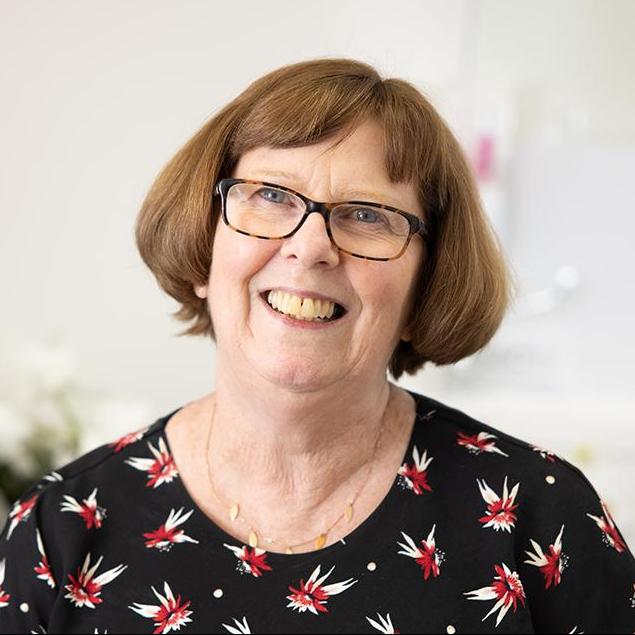 Professor Jenny Doust
Professor Jenny Doust
Principal Investigator, The University of Queensland
Professor Jenny Doust is a medical practitioner and researcher based at The University of Queensland. Professor Doust has forged a high-profile career combining her academic interests in evidence-based medicine, healthcare decision making and general practice.
Learn more about Professor Doust
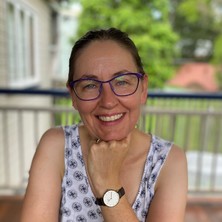 Associate Professor Susan Jordan
Associate Professor Susan Jordan
Co-investigator, The University of Queensland
Assoc Professor Jordan is a medically-trained epidemiologist with a focus on the aetiology of cancers and patterns of cancer care, particularly ovarian, thyroid and kidney cancers. Before starting her PhD, she worked in rural and urban general practice for over 10 years.
Learn more about Associate Professor Jordan
 Dr Tessa Copp
Dr Tessa Copp
Co-investigator, The University of Sydney
Dr Copp is a Postdoctoral Research Fellow in the University of Sydney School of Public Health. Her research focuses on evidence-based reproductive healthcare for women, including assisted reproductive technologies, pre-conception health and overdiagnosis.
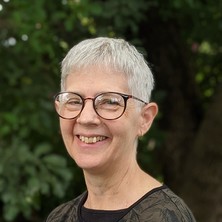 Dr Louise Wilson
Dr Louise Wilson
Co-investigator, The University of Queensland
Dr Wilson is a Postdoctoral Research Fellow in The University of Queensland School of Public Health. Her research focuses on women’s use of health services over the lifecourse. Dr Wilson completed a PhD at The University of Queensland in 2019 on the health consequences of having a hysterectomy.
 Professor Martha Hickey
Professor Martha Hickey
Co-investigator, University of Melbourne
Professor Martha Hickey is the Director of the Women’s Gynaecology Research Centre based at the Royal Women’s Hospital in Melbourne. Martha is a Professor of Obstetrics and Gynaecology at the University of Melbourne (since Feb 2010) and an Adjunct Professor of Obstetrics, Gynaecology and Reproductive Sciences at Yale University, CT. She is in active clinical practice with research expertise in menstrual disorders and menopause.
Learn more about Professor Hickey
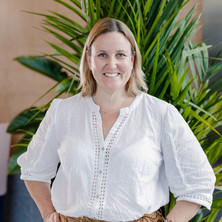 Dr Bec Jenkinson
Dr Bec Jenkinson
Research Fellow, The University of Queensland
Dr Jenkinson is a Qualitative Research Fellow with The University of Queensland School of Public Health, working on research projects related to weight stigma in maternity care, preconception health, and women's experiences of intrapartum care. Dr Jenkinson is a maternity consumer advocate-turned-researcher, with more than 10 years’ experience as a leader in the Australian maternity consumer movement.
 Dr Rachel Thompson
Dr Rachel Thompson
Associate Investigator, The University of Sydney
Dr Thompson is a behavioural scientist with The University of Sydney, conducting research on perinatal and reproductive health care in Australia. Dr Thompson has training in health psychology and shared decision-making, including development of a decision aid for heavy menstrual bleeding in the United States.
 Professor Gita Mishra
Professor Gita Mishra
Associate Investigator, The University of Queensland
Professor Mishra is Professor of Life Course Epidemiology at The University of Queensland and a Director of the Australian Longitudinal Study on Women’s Health. Professor Mishra is internationally recognised for her research on the links between reproductive characteristics, from menarche to menopause, and non-communicable diseases such as diabetes and cardiovascular disease.
Every year in Australia, about 14000 women have a hysterectomy for heavy menstrual bleeding. This is a much higher rate than in other similar countries, like the UK or New Zealand. In Australia, the rate of hysterectomy also varies widely between rural/regional and metropolitan areas.
Although complications from hysterectomy are low, concerns remain about the physical and psychological consequences, and the high variation in rates across Australia raises concerns about equitable access of care.
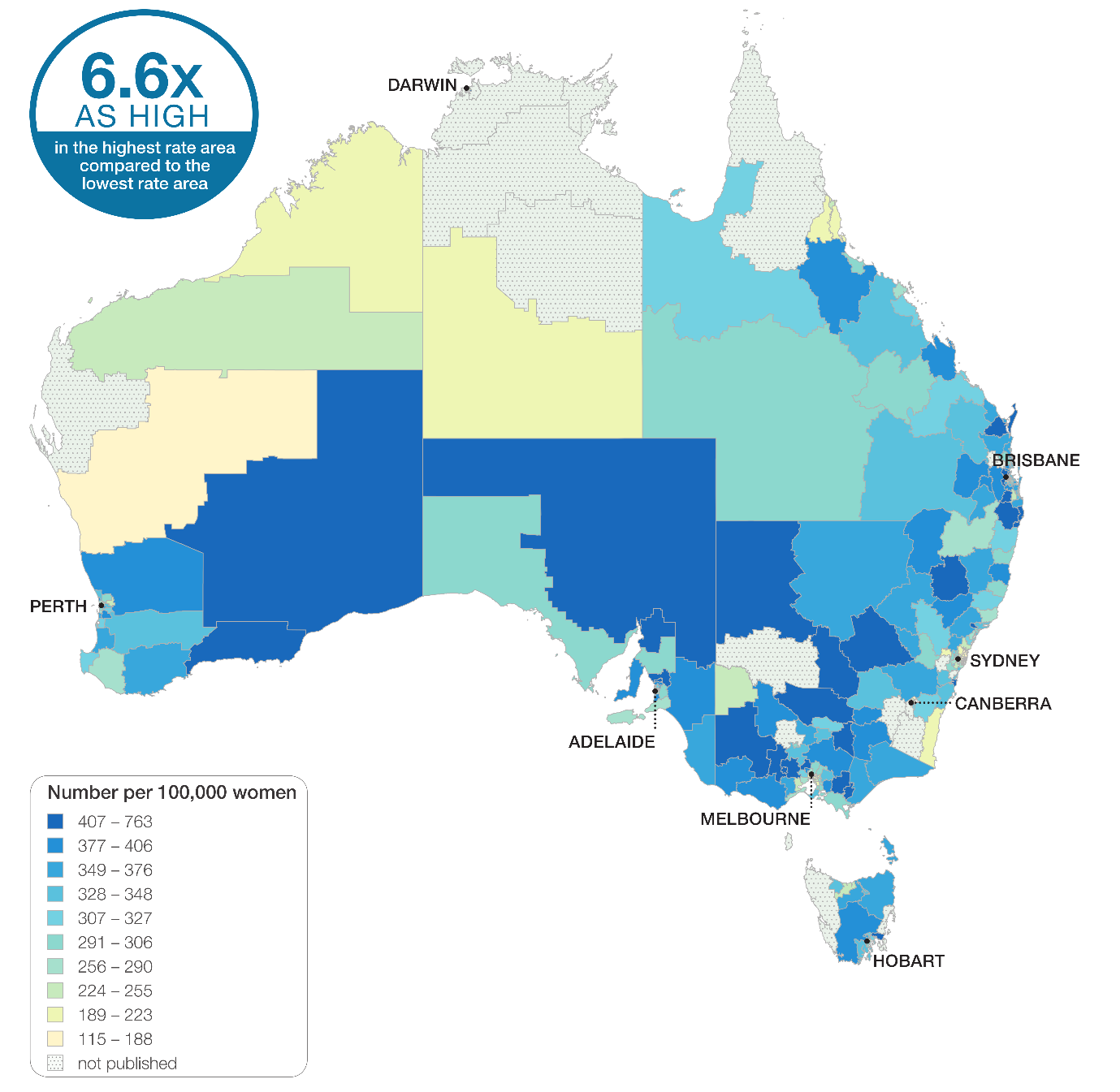
Reproduced with permission from the Second Australian Atlas of Healthcare Variation developed by the Australian Commission on Safety and Quality in Health Care (ACSQHC). ACSQHC: Sydney 2017
The HeMBDA project will include five studies to determine how frequently hysterectomy and uterine-sparing treatments, such as levonorgestrel-releasing intra-uterine devices (e.g. Mirena) and endometrial ablation, are used to treat heavy menstrual bleeding in Australia and to understand the reasons for the high variation in the use of these treatments.
Study 1
We will look at how frequently women who have been admitted to hospital for a hysterectomy for heavy menstrual bleeding are using uterine-sparing treatments prior to having a hysterectomy.
Study 2
We will look at the treatments women in the community with heavy menstrual bleeding are using and whether socio-demographic factors are associated with the use of different treatments.
Study 3
We will ask women who have experienced heavy menstrual bleeding how they felt about the treatments they used, what factors influenced their decisions, and if they were satisfied with the information provided to them.
Study 4
We will ask general practitioners and gynaecologists about their experience supporting women to make decisions about treatment.
Collectively, these four studies will help to clarify how frequently Australian women are using uterine-sparing treatments prior to hysterectomy, what factors are important in making these decisions, and what information or resources women are currently using to make these decisions.
Download participant information sheet (PDF, 237 KB)
Study 5
We will use these insights to work with women and clinicians to consider how decision aids developed overseas might be adapted for Australian women.
The HeMBDA study is guided by a Consumer Advisory Group. We gratefully acknowledge their input in providing advice and recommendations on how to:
- recruit people with lived experience of heavy menstrual bleeding to participate in the interviews
- focus the interviews with people with lived experience of heavy menstrual bleeding and clinicians
- make sense of the interviewees’ experiences
- report on and share the findings of the study with the community.
The Consumer Advisory Group will work alongside clinicians and researchers to consider how decision aids that have been developed overseas to support shared decision making about treatment options for heavy menstrual bleeding might be adapted for Australian women.
Project description
The HeMBDA team are seeking an exceptional PhD candidate to undertake research on how women and their clinicians make decisions about treatment options for heavy menstrual bleeding.
Hysterectomies are two times more common in Australia than in similar countries like New Zealand. Women in some parts of Australia are seven times more likely to have a hysterectomy than in other parts. Most women with heavy menstrual bleeding could potentially be managed in other ways. It is unclear how often Australian women are using other treatments to manage heavy menstrual bleeding or why so much variation is occurring.
The HeMBDA study will try to understand this by asking women who have had heavy menstrual bleeding how they felt about the treatments they used and what factors influenced their decisions. We will also ask doctors about how they help women to make these decisions. Based on these studies, we will develop a resource to support Australian women with heavy menstrual bleeding to choose the most appropriate treatment for their own circumstances.
This project will allow the successful applicant to develop skills in qualitative research, consumer engagement in research, and shared decision-making in healthcare, as well as skills in presenting research and scientific writing.
Supervisors
Professor Jenny Doust, The University of Queensland
Dr Bec Jenkinson, The University of Queensland
Dr Rachel Thompson, University of Sydney
Dr Tessa Copp, University of Sydney
Selection Criteria
Your application will be assessed on a competitive basis. We will take into account your:
- Previous academic record
- Publication record
- Honours and awards
- Employment history
A working knowledge of qualitative research methods would be of benefit. You will demonstrate academic achievement in a health-related discipline such as social work or psychology. Background knowledge of the Australian healthcare system is highly desirable.
Scholarship
Enrolment status: Future UQ student, Current UQ student
Student type: Domestic
Study level: Postgraduate research (HDR)
Funding type
This scholarship is funded through a HCF Research Foundation Health Services Research Grant. It includes: a living stipend, tuition fees, and a top-up.
Scholarship value
Living stipend of $32,192 per annum tax-free (2023 rate), indexed annually plus an additional $10,000 per annum.
Scholarship duration
3.5 years with the possibility of 1 extension in line with UQ and RTP Scholarship Policy.
